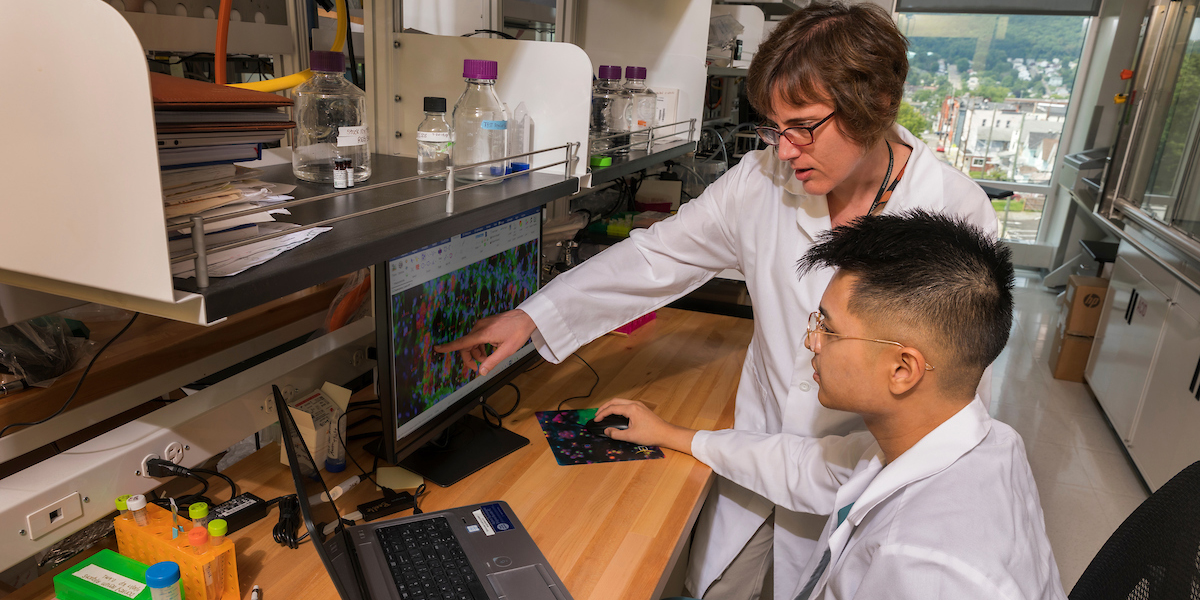Capstone research projects: Preceptors play a key role

Binghamton University PharmD students complete a rigorous academic program and clinical rotation experiences to prepare for graduation, much like students from other pharmacy schools. But one requirement Binghamton students must complete can set them apart — they must also complete a capstone research project.
“The capstone project is something that we are proud we offer because it gives our PharmD students an opportunity to do an actual research project before they graduate,” said Mohammad Ali, assistant professor of pharmaceutical sciences and director of the capstone project.
“Not many schools can give their graduates this opportunity to do actual scientific research starting from a literature search to formulating a hypothesis and doing actual experiments including data collection, analysis, conclusions and proposed future directions,” he said.
In their fourth year at the School of Pharmacy and Pharmaceutical Sciences, PharmD students work with both faculty and preceptors on the research experience.
“A good number of people participate very successfully in these capstone projects to give our students pharmacy-related research,” Ali added. “We have many external preceptors from hospitals like UHS and Guthrie, and even community pharmacies, that with a little bit of direction from us come up with a research idea and explain it to our students and train our students how to do this actual research.”
One example of such a project originated with Bassett Medical Center, Ali said. “Last year they trained our students to do research on pain management in patients receiving what we call Naltrexone (commonly known as Revia or Vivitrol),” he said. “Some patients have a substance or alcohol use disorder so they’re on a drug which blocks the pleasurable feelings associated with opioid or alcohol use. If some of those patients need a surgical procedure, pain control options are limited because they’re already on a medication which blocks the effects of opioids.
“Amanda Winans, a clinical pharmacy specialist, and Linda Demma, an anesthesiologist, worked with students to conduct research on what other options of pain management can be used in those patients who are on opioid blocker drugs,” he added. “It was really nice project.”
Ali said many capstone projects have already been published in national publications, in scientific journals at national meetings. He is working with Sarah Spinler, professor and chair of pharmacy practice, and Wesley Kufel, clinical associate professor of pharmacy practice, to gather information. “We are conducting a survey now for faculty and preceptors to collect that data,” he said. “We’re planning to publish our experience with capstones in a pharmacy journal and to share our experience in the last two years and coming years.
“The intent is to publish the data from our experience and compare it with other schools’ capstone projects,” he said.
Overall, the capstone project is a very important tool for PharmD graduates, Ali said. ”A lot of our students are excited to pursue a research career, but without this tool they would be discouraged. When we give them this extra tool, it’s a good addition on their CV for a postdoctoral fellowship in industry or a hospital or pharmaceutical company. It can give them a leg up.”
Off the top of his head, Ali said there are currently three SOPPS alumni involved in postdoctoral research experiences in pharmaceutical companies. “I think the capstone primed them to take this step,” he said. “Capstones give our grads a greater opportunity that this is another door to knock on or pursue if they want. It will encourage them if they want to pursue a research career.”
